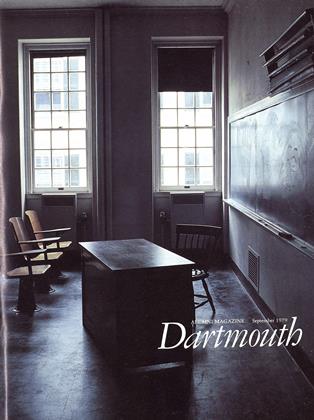When one invites friends to an anniversary party, it makes sense to choose a place to celebrate where people will feel comfortable. We have attended successful parties in local VFW halls and Elks clubs, in church basements where Hawaiian Punch was served, and in the Hopkins Center where champagne was sipped. Last spring we attended a winner: the celebration of the Dartmouth Outward Bound Center's tenth anniversary — held at the Campion's barn in Etna, where people threw open the doors to the cold, wet night and danced to the music of fiddles and banjos.
The dancing was a major attraction, as many of the guests had marked the completion of previous Outward Bound excursions by dancing at Harris Cabin or the Ravine Lodge. Fred Breunig '72, a professional musician and dance-caller who survived a winter course his senior year, called the figures and played top fiddle. The caterers, Murray and Karen Washburn, Hanover restaurateurs and Outward Bound veterans themselves, served a hot buffet and kept their table commendably clear of anything freeze- dried, scorched over a fire, or tainted with peanut butter. In another contrast to some Outward Bound meals, dinner was a sitdown affair, eaten off plates.
The Dartmouth center is the only chartered Outward Bound unit incorporated within another educational institution. Along with more than 30 Outward Bound schools on five continents, including six in the United States, it traces its roots to the ideas of the late educator Kurt Hahn, who left Germany to found a training school for British seamen during World War 11, and shares an affinity for adventure and challenge in education geared toward personal growth. The Dartmouth program is different from the others in that the purpose here has been to incorporate the concepts and methods of Outward Bound within the life and curriculum of the College.
The nature of the sometimes uneasy partnership between the College and the Outward Bound Center, which operates as part of the Tucker Foundation, has evolved considerably since eight students signed up for a month-long winter course in 1969. The basic program is now the Living- Learning Term, in which 12 Dartmouth students supplement their normal academic requirements on campus with a cooperative living arrangement in a house off-campus, an academic "core" course they take in common, community service projects, and the standard outdoor challenges spread out over the term.
Outward Bound also offers "laboratories," described by Robert MacArthur '64, the director, as "weekend experiences .designed with individual faculty members to complement classroom learning .... In a government course in criminal justice, for example, we incarcerated students in a jail for 48 hours." In addition, MacArthur is teaching a freshman seminar titled "Outward Bound: The Metaphor of Adventure in Education" and has extended the center's activities to working with the Dartmouth Medical School's Psychiatry Department in the treatment of selected patients.
The party started off with the usual drinking, milling, and maneuvering to stay near the crackers-and-cheese table, although there were some obvious differences from a conventional Hanover social hour: Sweaters outnumbered tweed jackets, running shoes and hiking boots outnumbered wing-tips and sandals, hugs were exchanged as often as handshakes, and nobody talked about the Red Sox. After dinner and the slide show, but before the dancing, a few people stood to remark on the "miraculous success" - or survival, depending on their point of view - of this peculiar kind of education at Dartmouth.
Wil Lange, the founding director and now a Hanover housing contractor, pointed to "the exponential increase in the square feet of office space" since his days in College Hall. Doc Dey '52, former dean of the Tucker Foundation and now president of Choate-Rosemary Hall, praised the different talents of people who can bring ideas to life (Lange), people who can keep ideas alive (MacArthur), and people who know when the time is right to leave (himself). He praised in particular his success in avoiding participation in an Outward Bound course. Sharon Forney, chief instructor for several years, talked about low and high points in her experience here, a high being the development of bicycling and women's courses and lows being "an experiment in sensory deprivation" in a blacked-out bomb shelter the week before her wedding, and then sharing a cabin with her colleagues on a staff training course the week after. Before MacArthur called for the dancing to begin, he was presented with the customary token of appreciation. Instead of a Dartmouth plate or chair, he received a canoe paddle.
 View Full Issue
View Full Issue
More From This Issue
-
 Feature
FeatureUps and Downs in the Big Leagues
September 1979 By Keith Bellows -
 Feature
FeatureTemples, Turtles and Fat Boys
September 1979 By Dan Nelson -
 Feature
FeatureThe Kids Danced
September 1979 By Robert Feakins -
 Article
ArticleThe Bard's American Friend
September 1979 By Michael Colacchio '80 -
 Class Notes
Class Notes1954
September 1979 By JOHN L. GILLESPIE, Fred Alpert '54 -
 Class Notes
Class Notes1974
September 1979 By WILLIAM B. CATER JR.
Article
-
 Article
ArticleBuilding Operations
November, 1910 -
 Article
ArticleINCOME AND EXPENSE SHOWN ON A PER STUDENT BASIS
October 1937 -
 Article
ArticleAlumni Dinner Schedule
February 1960 -
 Article
ArticleU. S. Army Announces New ROTC Scholarships
MAY 1965 -
 Article
ArticleScientific Politics or Political Science?
May 1995 By Amit Chibber '97 -
 Article
ArticleThe Undergraduate Chair
NOVEMBER 1931 By W. H. Ferry '32


